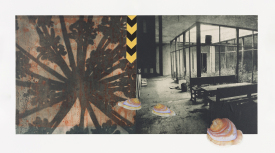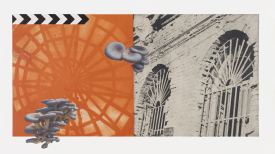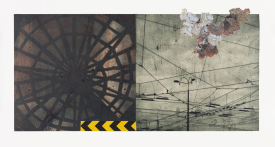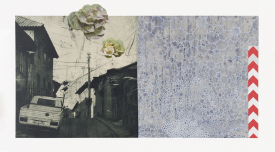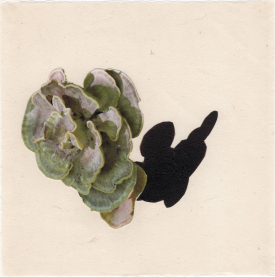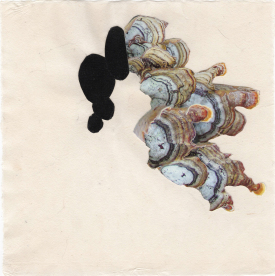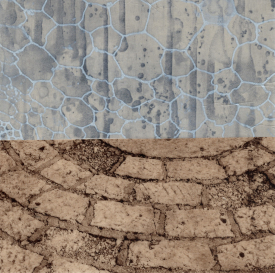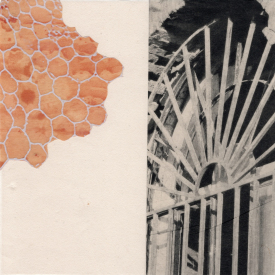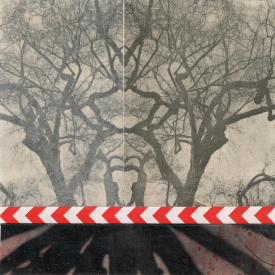Tanja Softić
by Marian Mazzone
Tanja Softić provides three recent sets of images, linked as ruminations on the losses of her personal past and the complications of our collective future. The series Memory and Entropy (2020), Night Blooms (2019), and Hybrid Being (2020) all urge us to recognize what was but also to think about what will be. Entropy and hybridity are modes of growth and change. They create something new where something else used to be. The artist offers her poetic images as a means to speak to us all about home and memory, change and disruption, and how to imagine new beginnings.
Softić makes her home in the United States, but she grew up in Sarajevo, Bosnia and Herzegovina, one of six republics that made up the former country of Yugoslavia. The dismemberment of Yugoslavia and the internal political divisions that remain in the region made life in her former home impossible. The events of the 1990s are in the past but have left deep marks in Sarajevo and in Softić’s psyche, which she shares with us in her work. The artist’s prints are multilayered and multimedia, large-scale screens across which imagery spreads. The color and scale suggest hybrid connections both visually and through mood. The past surfaces in the architectural details of the city of Sarajevo cast in black-and-white photogravure. In contrast, the beauty of new life mushrooms in color and via the organic forms of the fungi she depicts. Fungi live on the decaying materials they call home, spreading out networks underground to connect with one another and communicate. Softić uses the metaphor likewise to speak to us: of what it is like to be uprooted, what it is like when your home is destroyed and has yet to come fully back to life, and how it feels to have to locate alternative ground to live on and make new connections between what was and what is now. Her prints link images from the past that impress on her memory and order her vision of the world. The past colors the present, but the future begins to sprout on her composite surfaces. Softić has been through the loss of one home and the process of forging a new one. Through her work she hopes to tell us about that experience, and share with us both its pain and its purpose.
Bosnia and Herzegovina today is a very small place. The near destruction of the richly multinational and multiethnic republic that was once part of Yugoslavia, itself wiped off the map and largely forgotten, is a tragedy. But history, we are told, continually marches on, leaving the memories and detritus of people’s lives in its wake. We all live in precarious times. Softić speaks to us as a citizen of that changed Bosnia, a former citizen of that disappeared Yugoslavia. Home as a geographical location, as a nation can disappear. In our globalized and pandemic-linked world, we have found ourselves confined in our houses yet often challenged to feel the comforts of a home. What links us to a place and to each other? How do we make connections and networks that allow us to share memory, experience, and ideas when we are suddenly rooted in an unfamiliar spot, in a world profoundly different than from the one we knew not so long ago? Softić wishes to share with us her experience in order to consider those very questions.
Tanja Softić
Born in Sarajevo, Yugoslavia (present-day Bosnia and Herzegovina) (1966)
Lives and works in Richmond, Virginia
Tanja Softić works across the media of printmaking, drawing, photography, and book arts to explore questions of cultural belonging, hybridity, and memory. Softić earned a BFA from the Academy of Fine Arts of the University of Sarajevo in 1988 and her MFA in Printmaking from Old Dominion University in Norfolk, Virginia in 1992. She is currently Professor of Art and Chair of the Department of Art & Art History at the University of Richmond.
Softić’s work is included in numerous collections in the United States and abroad, among them New York Public Library, New York, NY; Library of Congress Print Department, Washington, D.C.; and New South Wales Gallery of Art, Sydney, Australia. She is a recipient of a National Endowment for the Arts/Southern Arts Federation Visual Artist Fellowship (1996), Painting Fellowship from the Virginia Commission for the Arts (2004), and a Pollock-Krasner Foundation Grant (2009), among other awards and honors.
Tanja Softić’s work was featured at the Halsey Institute in 2011 in Migrant Universe. A catalogue by the same title was produced in 2011.
Marian Mazzone
Dr. Marian Mazzone is Associate Professor of Art History at the College of Charleston. She is a specialist in new media and modern and contemporary art who earned her Ph.D. from The Ohio State University. Mazzone has extensive travel and research experience in Central and Eastern Europe (including Estonia, Latvia, Lithuania, Hungary, Czech Republic, Slovakia, Slovenia, Croatia, Bosnia-Herzegovina, Romania, Ukraine (Fulbright, 2005). In addition, Mazzone also does research in computational art and computer science applications to and art history. She works as a member of the Art & Artificial Intelligence Lab at Rutgers University.




